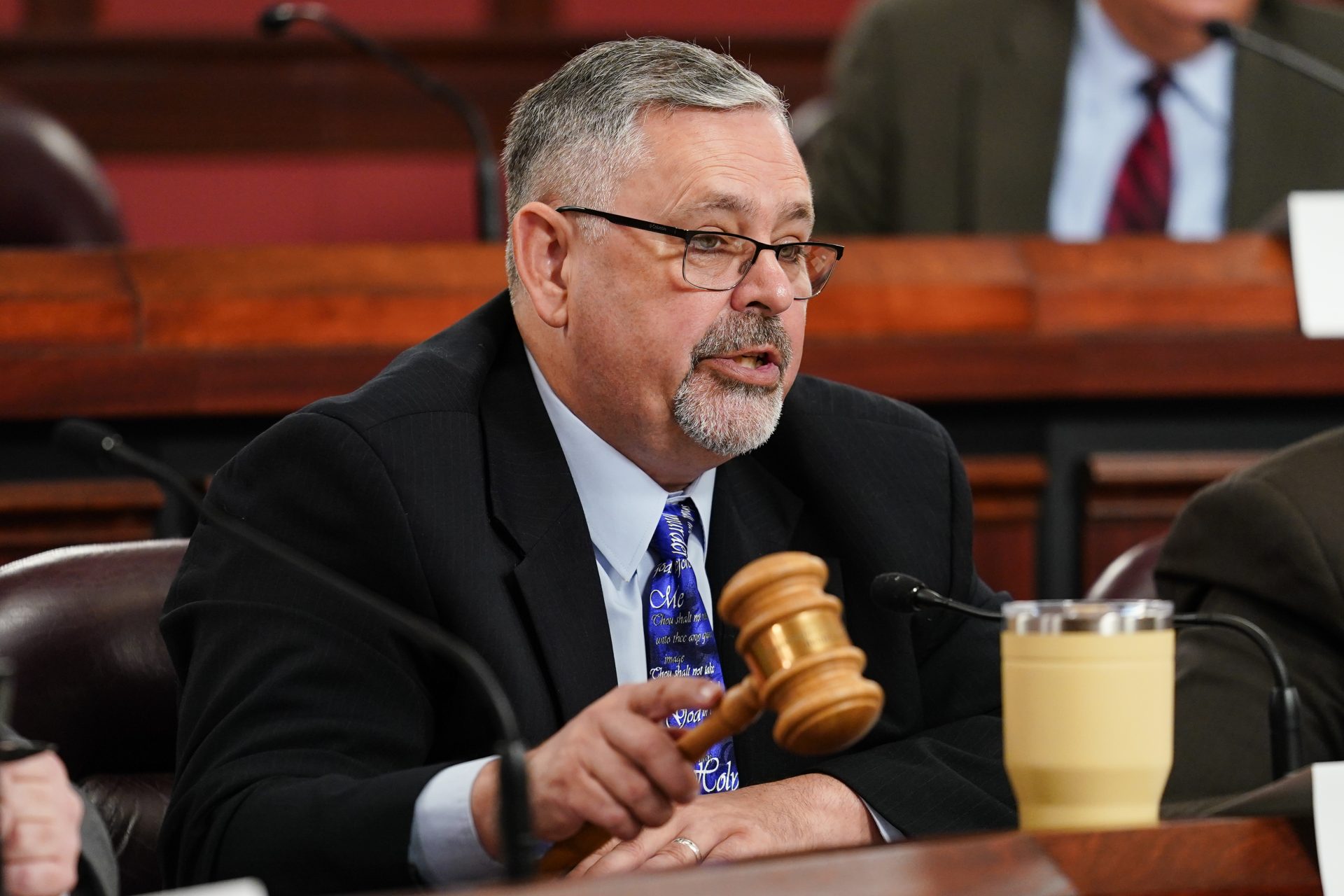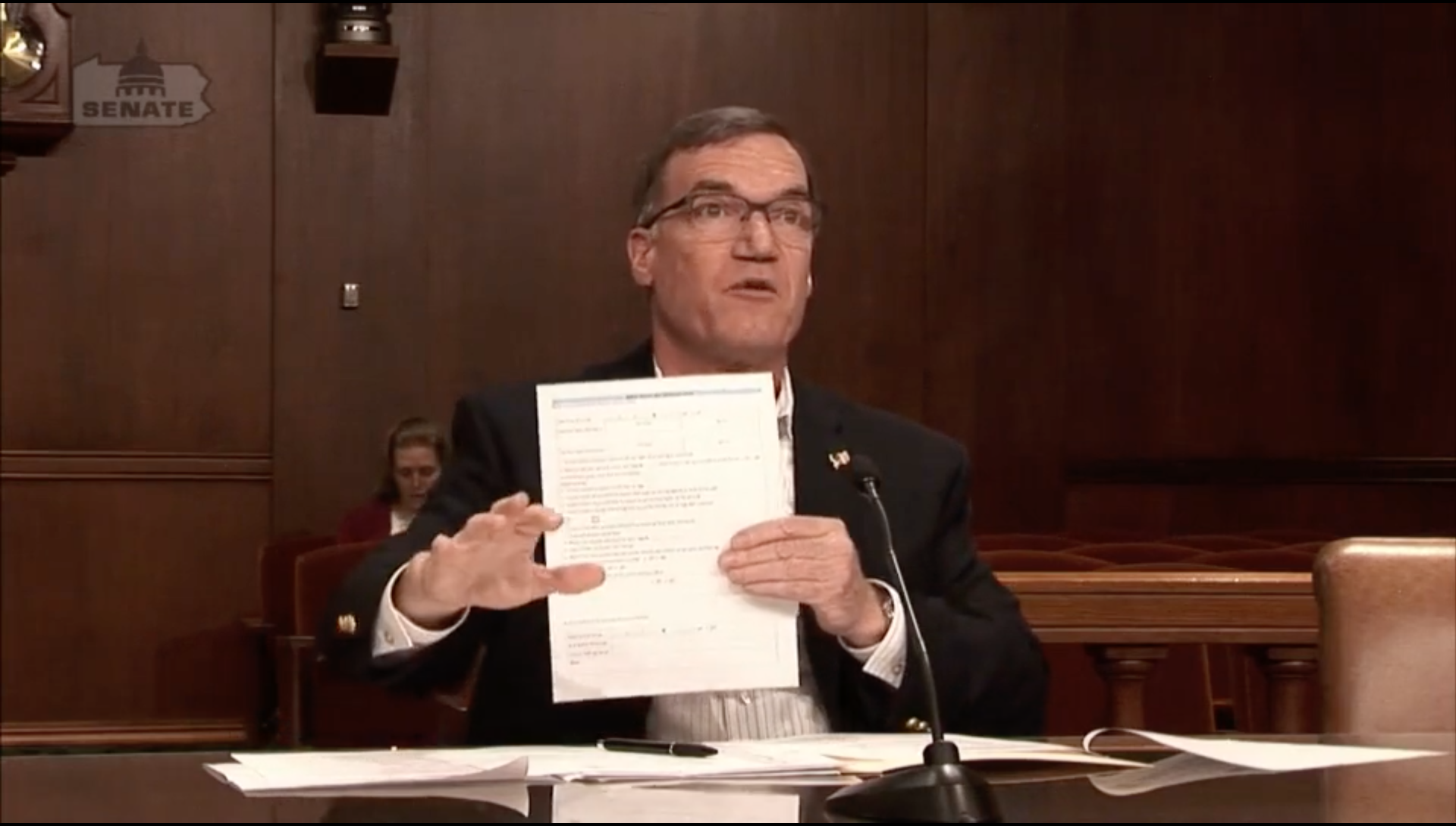(Harrisburg) – A Republican-led state Senate committee is sharing claims of voting irregularities from last fall’s election that do not show proof of widespread problems. Experts say the panel is trying to use those claims to justify sweeping changes to Pennsylvania’s mail-in ballot rules.
Since last September, the Senate’s Intergovernmental Operations committee has been asking Pennsylvanians to share any story in which they “witnessed or were personally and directly affected by election improprieties” as part of its efforts to probe the 2020 and 2021 elections. The panel asked those people to be “willing to sign an affidavit and potentially testify under oath at a Senate hearing.”
The committee had its most recent hearing last week, which was aimed at examining ballot drop boxes. Senators invited several witnesses with Republican ties to speak about people they claim to have seen dropping off more than one ballot at drop boxes last fall. That’s illegal under state law unless someone has written permission.
People who spoke to the committee were not asked to sign affidavits and were not placed under oath. That upset Democrats on the panel, led by Sen. Jay Costa (D-Allegheny), who left the meeting in protest shortly after the first witness began speaking.
“You’re going to be able to use this information as part of a court proceeding without having this person sworn in. I think it’s inappropriate,” Costa said.
Sen. Cris Dush (R-Cameron), the committee’s chair, explained the decision to reporters later.
“I wanted this to be more informative and free flowing in the way that the discussion went,” Dush said. “We have no intention of trying to do any prosecutions.”

Matt Rourke / AP Photo
Chairman of the Senate Intergovernmental Operations Committee Sen. Cris Dush, R-Jefferson, speaks during a hearing at the Pennsylvania Capitol in Harrisburg, Pa., Wednesday, Sept. 15, 2021.
As a House member in December 2020, Dush joined those who supported the election fraud lie by signing a letter asking Congress to not certify Pennsylvania’s vote for Joe Biden. And after last week’s hearing, he laid out what he and his Republican colleagues are after.
“Our purpose right now in this committee is to make sure that we’re getting the information out there so that we can take corrective action,” Dush said.
Four witnesses spoke with the committee. Two said they saw or discovered people illegally dropping off more than one ballot at drop boxes last fall.
Lehigh County’s Republican party chair Joseph Vichot showed what he alleged was surveillance video of an act that happened last October at the county’s government center. Lehigh County allowed its mail-in and absentee voters to use drop boxes workers at five locations.
Vichot said his group asked for the video from the county and received it in November. Party volunteers, he explained, played the raw footage, found the clip, and passed it along to two county lawyers to investigate.
“We just told them what we found and we asked them to investigate. We said obviously these are just allegations, but this is what we found,” Vichot said.
Vichot also claims his group logged other instances where people were dropping multiple ballots into that box last fall, but didn’t share that publicly.
Then came Luzerne County elections judge Jessica Morgan, who claimed she saw someone try to deposit multiple mail ballots. But she didn’t record the incident and couldn’t produce surveillance tape.
Both publicly admitted they don’t really know what happened in either case, but Dush drew a conclusion anyway.
“We’ve discovered some very significant things in this hearing. We’ve been able to show that ballot stuffing does occur in Pennsylvania,” he said.
Fair Elections Center president and voting rights expert Robert Brandon, who has been watching efforts to look into what Republicans call “voting integrity” across the country, said he’s started to notice a pattern.
“What’s happening in Pennsylvania is just the precursor for the legislature to come back with some additional efforts to try to make voting more difficult,” Brandon said.
Brandon explained Arizona senators followed that playbook during their discredited election probe, which confirmed President Joe Biden’s victory there. Dush visited Arizona’s effort last summer with a group of other senators, saying he “absolutely” wanted to duplicate the process in the Keystone State.
“They [Arizona Republican senators] just said, ‘Oh, well, we’re really concerned and suspicious about what happened here, and we looked at everything.’ That’s all they needed to then get the Arizona legislature, which is controlled by Republicans and a Republican governor, to sign not one, but two voter suppression laws,” Brandon said.
One of the laws requires Arizona election workers to look into someone’s citizenship and block them from voting if they can’t verify their status. The state’s Republican party also petitioned the Arizona Supreme Court to overturn its early voting and vote-by-mail laws, which the court declined to consider this week.
Back in Pennsylvania, the committee’s witnesses suggested lawmakers do the same thing –even though multiple audits confirmed past results.
“Stop the mail-in balloting completely, and until we have a constitutional amendment saying that we can do early voting, then we can set up a system where it’s similar but you do it in a method where we have confidence that those votes are the right votes,” Vichot said.

Screenshot via Pa. Senate Intergovernmental Operations committee
Lehigh County Republican party chaiman Joseph Vichot speaks during a meeting of the Senate Intergovernmental Operations committee on March 31, 2022.
Jessica Morgan added she opposes drop boxes, adding she had tried and failed alongside others to get county commissioners to ban them before last fall’s election.
Dush said he believes drop boxes are in “violation of the intent of the law,” even though state and federal courts have ruled the devices are both constitutional and helpful.
“The [election law] language used by the Legislature regarding where a mail-in ballot may be delivered in person is not solely limited to the official central office of the county board of election,” the Pennsylvania Supreme Court ruled in Sept. 2020.
A federal judge in Pittsburgh appointed by former President Donald Trump added drop boxes “do not significantly burden any right to vote…they align with the Commonwealth’s elaborate election-security measures. They do not run afoul of the United States Constitution. They will not otherwise be second-guessed by this Court.”
Less than a week after the Senate committee met, Lehigh County’s Republican District Attorney, Jim Martin, reported investigators found 288 mail-in voters – out of nearly 15,000 – submitted more than one ballot at Lehigh County dropboxes last fall. In a memo he shared with the press, Martin said his team relied on the same surveillance tape as Vichot to reach that conclusion.
He added that because most of those voters only dropped off two ballots, they were probably submitting those of their partner or family member.
“It would appear that the only way to ensure that the statute is not violated in this manner is to require that an election official receive the ballot directly from the elector,” Martin wrote. “This of course would end ’no excuse mail-in voting’ and would erase the necessity of drop boxes.”
Martin said he supports such a move.
Policy expert Scott Seeborg of advocacy group All Voting Is Local said, given the facts surrounding the Lehigh County case, he thinks fraud probably wasn’t involved.
“There’s a difference between a voter thinking it’s ok to take their family member’s ballots and drop them off and a political operation that goes door to door in an entire county to do that,” he said.
Other voting rights advocates – like Deidre Lesene of Voter Empowerment Education & Enrichment Movement Pittsburgh – said lawmakers need to consider the consequences of voting law rollbacks. Lesene, who also works as a poll worker in the Pittsburgh area, said rolling back ballot access rules would be tough on the communities of color she helps each cycle.
“One minute we’re telling them that they’re empowered, and they now have more opportunities to vote, and in the next minute we have to … say, ‘Wait no, now we’re going back to this.'”
Lesene said the state could give counties more money to run their elections and for voter education efforts – instead of ditching things like drop boxes. When asked, Dush said he supports those ideas.
“We want it to be as easy as possible to vote,” Lesene said. “because there’s a distrust in democracy and this just adds to the distrust that BIPOC [Black, Indigenous, People of Color] communities have.”
The Senate committee will eventually issue a report on its probe, with legislation expected to follow. A few proposals from lawmakers like Sen. Doug Mastriano (R-Franklin) that would restrict mail-in voting rules are already floating around.
Dush, the committee’s head, announced Friday he is sponsoring a bill to ban drop boxes, citing the claims around the devices aired at last week’s hearing. Rep. Mike Schlossberg (D-Lehigh) argues it’d be better if the law was changed to allow family members to drop off each other’s mail-in ballots at drop boxes.
“I’m fine with a wholesale change that allows someone to drop off their spouse’s ballot, but if you start saying, ‘Well, dropboxes are clearly allowing fraudulent behavior to occur,’ that’s absolutely obscene,” Schlossberg said.
As part of WITF’s commitment to standing with facts, and because the Jan. 6, 2021 attack on the U.S. Capitol was an attempt to overthrow representative democracy in America, we are marking elected officials’ connections to it. Read more about this commitment.
Sen. Dush (R-Cameron), as a member of the House, and Sen. Mastriano (R-Franklin) signed letters with other Republican lawmakers asking Congress to either object to or delay certifying Pennsylvania’s 2020 election result.
Both did so despite no evidence that would call that result into question. This supported the election-fraud lie, which led to the attack on the Capitol.


0 Commentaires